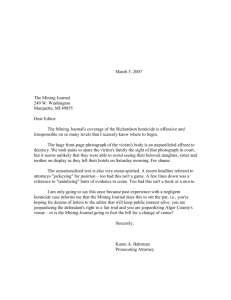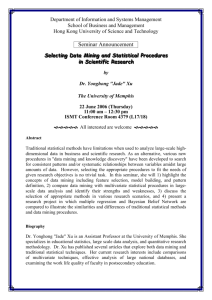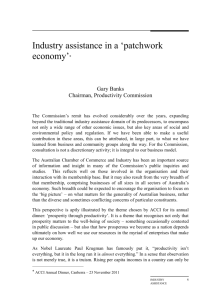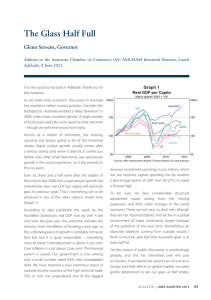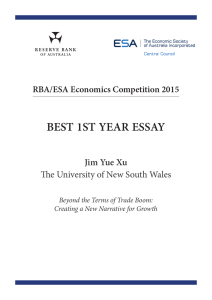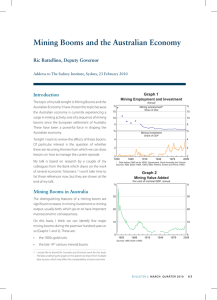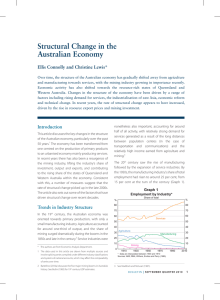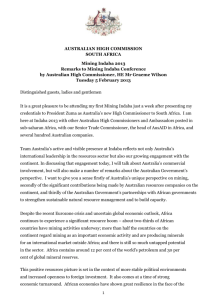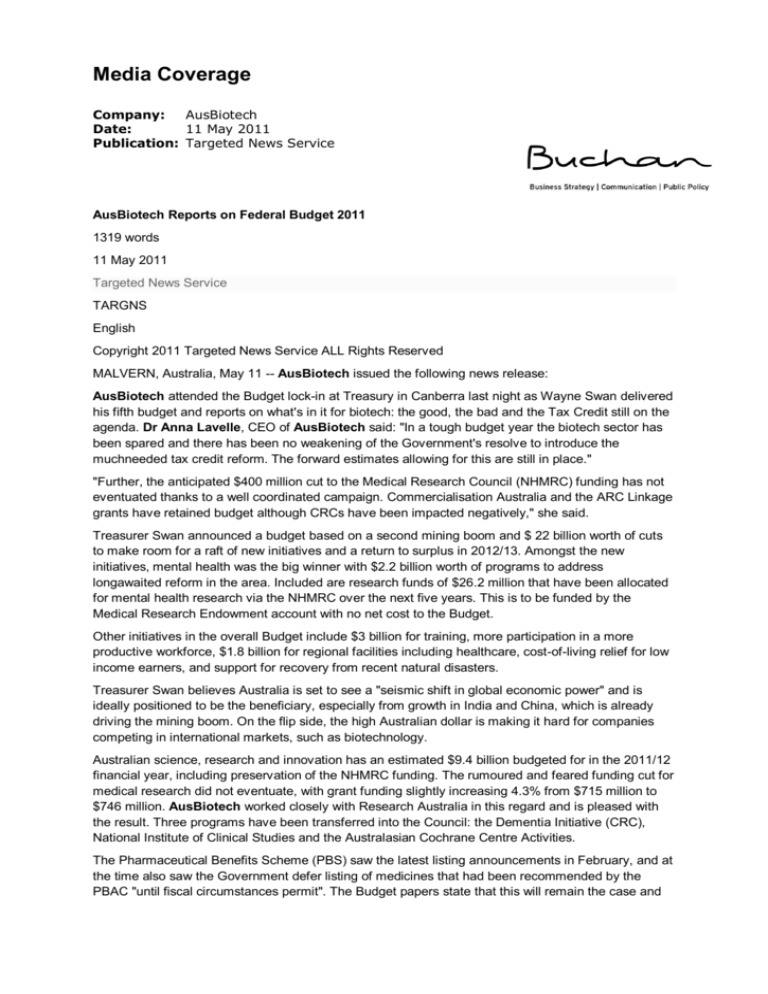
Media Coverage
Company:
AusBiotech
Date:
11 May 2011
Publication: Targeted News Service
AusBiotech Reports on Federal Budget 2011
1319 words
11 May 2011
Targeted News Service
TARGNS
English
Copyright 2011 Targeted News Service ALL Rights Reserved
MALVERN, Australia, May 11 -- AusBiotech issued the following news release:
AusBiotech attended the Budget lock-in at Treasury in Canberra last night as Wayne Swan delivered
his fifth budget and reports on what's in it for biotech: the good, the bad and the Tax Credit still on the
agenda. Dr Anna Lavelle, CEO of AusBiotech said: "In a tough budget year the biotech sector has
been spared and there has been no weakening of the Government's resolve to introduce the
muchneeded tax credit reform. The forward estimates allowing for this are still in place."
"Further, the anticipated $400 million cut to the Medical Research Council (NHMRC) funding has not
eventuated thanks to a well coordinated campaign. Commercialisation Australia and the ARC Linkage
grants have retained budget although CRCs have been impacted negatively," she said.
Treasurer Swan announced a budget based on a second mining boom and $ 22 billion worth of cuts
to make room for a raft of new initiatives and a return to surplus in 2012/13. Amongst the new
initiatives, mental health was the big winner with $2.2 billion worth of programs to address
longawaited reform in the area. Included are research funds of $26.2 million that have been allocated
for mental health research via the NHMRC over the next five years. This is to be funded by the
Medical Research Endowment account with no net cost to the Budget.
Other initiatives in the overall Budget include $3 billion for training, more participation in a more
productive workforce, $1.8 billion for regional facilities including healthcare, cost-of-living relief for low
income earners, and support for recovery from recent natural disasters.
Treasurer Swan believes Australia is set to see a "seismic shift in global economic power" and is
ideally positioned to be the beneficiary, especially from growth in India and China, which is already
driving the mining boom. On the flip side, the high Australian dollar is making it hard for companies
competing in international markets, such as biotechnology.
Australian science, research and innovation has an estimated $9.4 billion budgeted for in the 2011/12
financial year, including preservation of the NHMRC funding. The rumoured and feared funding cut for
medical research did not eventuate, with grant funding slightly increasing 4.3% from $715 million to
$746 million. AusBiotech worked closely with Research Australia in this regard and is pleased with
the result. Three programs have been transferred into the Council: the Dementia Initiative (CRC),
National Institute of Clinical Studies and the Australasian Cochrane Centre Activities.
The Pharmaceutical Benefits Scheme (PBS) saw the latest listing announcements in February, and at
the time also saw the Government defer listing of medicines that had been recommended by the
PBAC "until fiscal circumstances permit". The Budget papers state that this will remain the case and
Media Coverage
Company:
AusBiotech
Date:
11 May 2011
Publication: Targeted News Service
will be reconsidered when "appropriate to do so". Meanwhile, changes
to the "PBS with financial implications will be considered by Cabinet."
In Minister Carr's Industry, Innovation, Science and Research portfolio, the R&D Tax Credit is still on
the agenda, two years after it was announced. The legislative Bills that are awaiting debate in the
Senate have been provided for in the program expense budget statements, despite the lack of a
deciding vote from Senator Fielding. The Department has set aside $2.4 million to administer the
program in the 2011/12 financial year and $10.4 million over the forward estimates period. Now the
sector looks to the Greens and in particular Senator Milne to deliver this essential reform.
AusBiotech expects the Tax Credit to be debated in the Senate this July and has early indications
that Senator Milne is well briefed and supportive of additional support for small innovative business.
Last week, The Australian Business Foundation published a report by Dr Nicholas Gruen of Lateral
Economics, The BERD in the hand: Supporting Business Investment in Research and Development.
Dr Gruen's paper focuses on proposals for reform of the tax treatment of business research and
development currently before Federal Parliament and gives a deep analysis on these important
changes, with commentary of the arguments behind the R&D legislation and its effectiveness,
especially in fostering greater investment in R&D and innovation by smaller businesses.
The report recommended the Government's proposed new R&D Tax Credit scheme replacing the
current one should be passed into law and said the proposed changes to the existing R&D tax
concession are soundly based in policy. "Further delay in passing them would not only delay the
increases in R&D investment from small firms that could be expected from the changes, but could
also retard investment in R&D by smaller firms, even if it were viable under the current regime."
The report also noted that "Mining claims have expanded substantially faster than the expansion in
mining investment. Indeed, in 2008-9 claims for R&D in mining exceeded the claims made in
manufacturing for the first time. Further, Australian miners claim a dramatically higher share of R&D in
their mining investment than their counterparts do in comparable countries like Canada."
In view of the Government's prediction that the mining boom is gathering pace, and planning to invest
$76 billion in 2011/12 - eight times its pre-boom level - the tax arrangement remaining as a
concession program could present serious pressure on the program.
Dr Lavelle said: "The mining boom will result in more R&D Tax Concession funds channeled into
mining and the Tax Credit reform would redirect some of those monies to biotechnology, medical
technology, ICT and other innovative industries, and we expect this will provide a significant boost to
our sector."
Also in Minister Carr's portfolio, the CSIRO will receive a "record" $3 billion in funding on top of annual
work contracts worth approximately $100 million. The Australia China Science and Research Fund is
to be established with $9 million over three years for bilateral research collaborations with China.
Paving the way for more young people in science, the Inspiring Australia initiative received $21million
for three projects:
- Promoting National Science Week;
- Prime Minster Prize and other awards to reward and recognise researchers;
- National hub for science and technology communications.
Media Coverage
Company:
AusBiotech
Date:
11 May 2011
Publication: Targeted News Service
On the down-side, $20.7 million will be cut from the Collaborative
Research Networks, $33.4 million over four years from the CRC program, $6 million over three years
from Enterprise Connect ($101.3 million over four years will remain). And the cessation of the Green
Car Innovation Fund is to be cut by $434.2 million over the forward estimates period and $601 million
in total.
In the Health and Ageing portfolio, $4.1 million over four years was budgeted to continue the
pandemic response system which includes treatments for swine flu, as well as $15 million over four
years to maintain the HPV Vaccination Program Register and $138.7 million over four years to
continue the bowel screening program. Pathology services saw a big loss with $550 million removed
from the Path Funding Agreement over the life of the program, and the National Cord Blood Collection
Service Network (AusCord) will lose $1.5 million.
In the Small Business portfolio the Entrepreneurs' Tax Offset (ETO) will be replaced with tax reforms
for 2.7 million small businesses with effect from the 2012-13 income year. The Government says
instead, small business will benefit from the Government's small business tax reform package,
including a new instant write-off for the first $5,000 of a motor vehicle, to commence from the 2012-13
income year.
The Small Business Support Line will receive $7.1 million over four years to provide continued
support, after the line received almost 30,000 calls in less than two years of operation.





